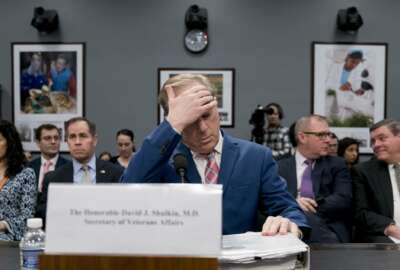Despite recent reports that his job is in jeopardy, Veterans Affairs Secretary David Shulkin told Congress it was business-as-usual as he answered questions about the department’s 2019 budget.
“I’ve come here for one reason and that’s to improve the lives of veterans, and that’s what I’m focused solely on doing,” Shulkin told the House Appropriations Subcommittee on Military Construction, Veterans Affairs and Other Agencies. “There are a lot of people that, frankly, are more interested in politics than I am. I’m interested in getting this job done.”
Not one member on the subcommittee brought up any further controversy, and all kept their questions focused on VA’s 2019 budget and the department’s priorities.
“I very much enjoyed working with you in the previous administration and now this administration,” Subcommittee Chairman Charlie Dent (R-Pa.) told Shulkin at Thursday’s budget hearing. “Your expertise and your experience in health care systems management is extraordinary, and I’m glad you’re in the job that you’re in.”
Shulkin said he regretted the recent distractions and is trying to move forward. He denied reports that he’s using his security detail any differently than his colleagues.
“Every cabinet member has a security detail that is armed,” Shulkin said. “I am no different. I’ve done nothing different in my security protocol. There has been no change from what it ever has been. But I don’t like discussing my security protocol, and I’m not going to give those details.”
And as Shulkin’s future remains in question, the fate of the Veterans Choice Program is uncertain as well.
“Has this administration, or anyone, pushed you to move the VA in the direction of privatization?” said subcommittee Ranking Member Debbie Wasserman Schulz.
She said she feared “the snowball was rolling faster down the hill” in favor of privatization.
“There is no pressure to privatize,” Shulkin said. “There is pressure to fix the system.”
Using the new caps set in the Bipartisan Budget Act of 2018, the Trump administration recently requested an additional $1.9 billion in discretionary funding for the VA Choice Program in fiscal 2019.
But members of Congress aren’t completely on board on with this proposal.
“I’m not sure there’s an appetite to provide discretionary money for a program that remains a mandatory one for another year,” Dent said.
Members of Congress have been debating and searching for a new path forward for the Veterans Choice Program for years.
Democrats, meanwhile, are concerned about the prospect of simply pumping more funds into the program, particularly as the future of the VA Choice Program still remains in limbo.
Though both the House and Senate Veterans Affairs Committees spent much of 2017 working with the Legion and other veterans service organizations on a variety of ideas detailing a future VA Choice program, lawmakers in both chambers punted the issue to 2018.
Yet veterans service organizations recently described the prospect of VA privatization as a “very real issue.” The White House submitted its own suggestions on new legislative language to include in the Senate bill.
VA spending on community care would increase by 49 percent between fiscal 2017 and 2019, Wasserman-Schultz said, while funding for VA-care would rise by 9 percent during the same time period. Those increases don’t include two doses of emergency funding — worth $4 billion — that Congress has authorized for the program this fiscal year.
VA has $1.1 billion left in its Choice program account as of March 6. Those resources will likely run dry by the end of May or the first or second month of June, Shulkin said. The department will exhaust existing Choice funds before the fiscal year ends.
EHR
As Defense officials last week acknowledged early deficiencies with the rollout of the military’s new electronic health record, Shulkin he said he’s still confident in his decision to implement the same EHR.
After meeting with the Defense Health Agency’s director, Vice Adm. Raquel Bono, to discuss the agency’s challenges, Shulkin said he believes VA will have a smoother implementation.
“A lot of things could go wrong,” he acknowledged. “This is not so much about the technology as [it’s] about how we manage change … across the system. We’re going to go from 130 instances to a single virtual instance in the VA. That’s going to require the type of standardization that you’re talking about, and that is really very complex. In order to do that, we’re standing up a project management office. The project management office’s job will be the oversight of that exact process of change management.”
VA, however, still hasn’t signed its own contract with Cerner Corporation. The department decided to “pause” negotiations with the vendor while it worked with the MITRE Corporation to coordinate and review contract language to ensure that it conveys the department’s need for interoperability with its community providers.
During that process, MITRE generated more than 51 recommendations. The department is building all of them into its contract, Shulkin said.
“We know we have one shot at this,” he said. “As you said this is an expensive investment and it’s a long investment, and if we don’t get it right in the beginning, I don’t think we’re going to have a chance to go back and do it over. We are taking extraordinary lengths to get the expertise around the country to give us their input. We absolutely did build in the MITRE recommendations, and we’re still looking to do a few more reviews before we say that we’re ready to move forward. Hopefully that will be soon.”
Copyright
© 2024 Federal News Network. All rights reserved. This website is not intended for users located within the European Economic Area.
